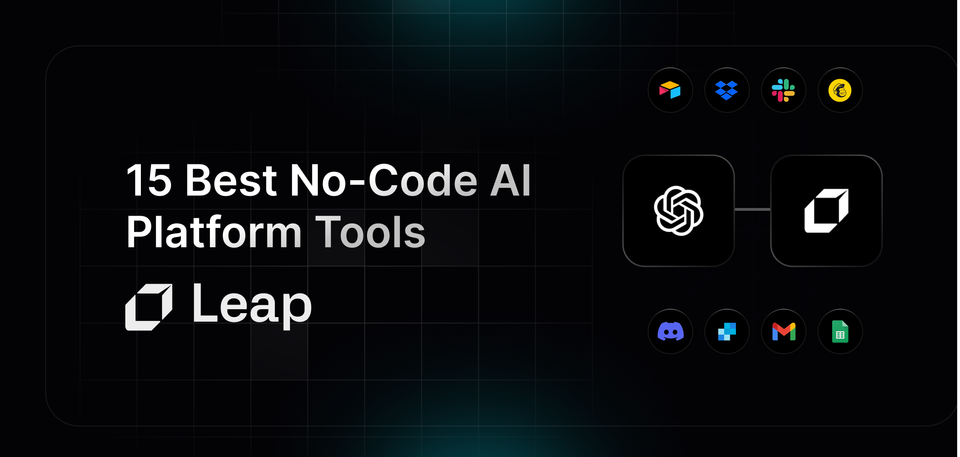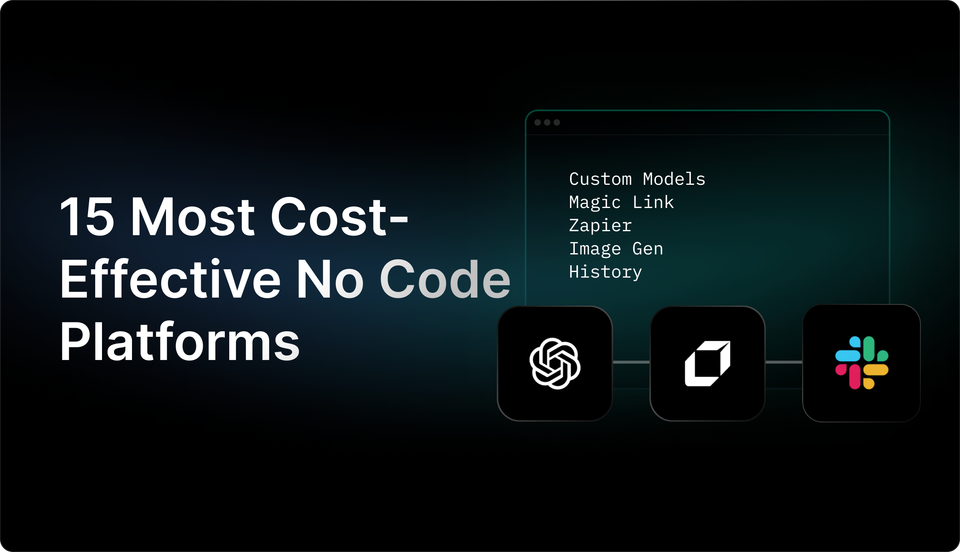29 Use Cases To Use Artificial Intelligence In Business To Optimize Your Operations
Unlock business potential with AI solutions. Boost efficiency and growth. Elevate your strategy with artificial intelligence in business.

The intersection of technology and business has paved the way for groundbreaking advancements, and one such innovation that continues to revolutionize industries is artificial intelligence and no code AI in business. From streamlining operations to enhancing decision-making processes, AI in business has emerged as a formidable force that holds immense potential for growth and transformation. Whether you're an industry veteran or a curious enthusiast, delving into the realm of artificial intelligence in business promises a captivating journey that unravels the boundless possibilities of this cutting-edge technology.

What Is Artificial Intelligence?

Artificial intelligence is a revolutionary technology that has the potential to transform the way businesses operate. It refers to the simulation of human intelligence in machines that are programmed to think and learn like humans. With AI, computers can analyze large amounts of data, recognize patterns, and make informed decisions, enabling businesses to optimize their operations and drive growth.
1. Understanding Artificial Intelligence in Business
AI in business involves the use of intelligent algorithms and systems to enhance efficiency, productivity, and decision-making. It encompasses various technologies such as machine learning, natural language processing, computer vision, and robotics. By applying AI, businesses can automate repetitive tasks, gain valuable insights from data, personalize customer experiences, and improve overall performance.
2. The Benefits of AI in Business
The integration of AI into business processes offers numerous benefits. AI-powered systems can analyze vast amounts of data in real-time, leading to more accurate predictions and informed decision-making. This enables businesses to identify patterns and trends, optimize resource allocation, and forecast customer demands. AI can automate routine tasks, freeing up employees' time for more strategic and creative work. AI can enhance customer experiences by providing personalized recommendations, chatbots for customer support, and virtual assistants for personalized shopping experiences.
3. Applications of AI in Business
AI finds applications in various areas of business, including marketing, finance, supply chain management, and customer relationship management. In marketing, AI can analyze customer behavior and preferences to enable targeted advertising and personalized marketing campaigns. In finance, AI algorithms can improve risk assessment, fraud detection, and automate investment decisions. In supply chain management, AI can optimize inventory management, demand forecasting, and logistics. Finally, in customer relationship management, AI can provide automated customer support, sentiment analysis, and personalized recommendations.
4. Overcoming Challenges in Implementing AI
While the potential benefits of AI in business are significant, there are challenges to overcome. Data quality and accessibility are crucial for successful AI implementation. Businesses need to ensure that their data is clean, well-organized, and easily accessible. There may be concerns about data privacy and security when using AI systems. Ethical considerations, such as bias in algorithms, transparency, and accountability, also need to be addressed to build trust among consumers and employees.
5. The Future of AI in Business
The future of AI in business looks promising. As technology continues to advance, AI will become more sophisticated, enabling businesses to unlock even greater potential. AI-powered virtual assistants and chatbots will become more intelligent, providing seamless customer experiences. Machine learning algorithms will continue to improve, enabling businesses to gain deeper insights from data and make more accurate predictions. The rise of AI in business will create new job opportunities requiring specialized skills in AI development, data analysis, and AI strategy.
AI is a game-changer for businesses, offering a wide range of benefits across various industries. By harnessing the power of AI, businesses can optimize their operations, gain valuable insights, and deliver personalized experiences to their customers. Implementing AI requires careful consideration of data quality, privacy, and ethics. As AI continues to evolve, the future of business holds immense potential for growth and innovation.
Related Reading

The Benefits of Using Artificial Intelligence In Business

AI has revolutionized various industries, and when it comes to business, its benefits are manifold. One of the key advantages of incorporating AI into your business strategy is its ability to supercharge your team's performance. By automating mundane and repetitive tasks, AI frees up your employees' valuable time and energy, allowing them to focus on more complex and creative work.
AI-powered virtual assistants, for example, can handle routine customer inquiries, data entry, and scheduling, leaving your human employees with more time to engage in meaningful customer interactions, brainstorm innovative ideas, and develop new strategies. This not only increases overall productivity but also enhances employee satisfaction, as they can concentrate on tasks that require critical thinking and problem-solving skills.
Driving Profitability through AI in Business
In addition to boosting team performance, AI can significantly impact your business's profitability. Through machine learning algorithms, AI analyzes vast amounts of data to identify patterns, trends, and insights that might otherwise go unnoticed. By leveraging this data-driven intelligence, businesses can make informed decisions that optimize processes, streamline operations, and reduce costs.
For instance, AI-powered predictive analytics can assess customer behavior, market trends, and competitor strategies to forecast demand and optimize inventory management. Implementing AI in supply chain management can minimize wastage, prevent stockouts, and reduce storage costs, ultimately improving the overall efficiency and profitability of the business.
Creating New Product Offerings with AI
AI not only enhances existing business operations but also opens up avenues for creating completely new product offerings. By leveraging AI technology, businesses can develop innovative solutions that cater to changing customer needs and preferences.
Enhancing Customer Interaction
AI-powered chatbots and virtual assistants can provide personalized recommendations, offer tailored shopping experiences, and assist customers in finding the perfect product or service. This not only enhances customer satisfaction but also increases the likelihood of repeat purchases and brand loyalty.
Revolutionizing Experiences
AI can enable businesses to create more immersive and interactive experiences. Virtual reality (VR) and augmented reality (AR) technologies, combined with AI algorithms, can create realistic simulations and personalized experiences that were previously unimaginable. This has tremendous potential for industries such as tourism, gaming, and retail, where customers can virtually test products or explore destinations, thereby driving engagement and boosting sales.
The Future of AI in Business
As AI continues to evolve, its potential benefits for businesses will only grow. From streamlining operations to enhancing decision-making, creating new product offerings, and revolutionizing customer experiences, AI is poised to become an essential tool for businesses of all sizes and industries.
It's important to remember that successful integration of AI requires careful planning, investment in infrastructure, and continuous monitoring to ensure ethical use and mitigate potential risks. With the right approach, AI can unleash the full potential of businesses, driving growth, profitability, and innovation.
29 Use Cases To Use Artificial Intelligence in Business To Optimize Your Operations

1. Customer Segmentation and Targeting
AI can analyze customer data to segment and target specific groups with personalized marketing campaigns, leading to higher conversion rates and customer satisfaction.
2. Predictive Analytics
AI algorithms can analyze historical data to predict future trends and outcomes, enabling businesses to make informed decisions and optimize their operations accordingly.
3. Supply Chain Optimization
AI-powered systems can analyze complex supply chain data to identify bottlenecks, optimize inventory levels, and streamline logistics, resulting in reduced costs and improved efficiency.
4. Fraud Detection
AI algorithms can detect patterns and anomalies in financial transactions, helping businesses identify and prevent fraudulent activities, saving them significant monetary losses.
5. Chatbots and Virtual Assistants
AI-powered chatbots and virtual assistants can handle customer inquiries, provide support, and automate repetitive tasks, enhancing customer service while reducing operational costs.
6. Sentiment Analysis
AI can analyze customer feedback and social media data to gauge public sentiment towards a brand, allowing businesses to adapt their strategies and improve reputation management.
7. Demand Forecasting
AI algorithms can analyze historical sales data, market trends, and external factors to accurately forecast future demand, enabling businesses to optimize production and inventory levels.
8. Personalized Recommendations
AI-based recommendation engines can analyze user behavior and preferences to provide personalized product recommendations, increasing cross-selling and upselling opportunities.
9. Quality Control
AI systems can analyze sensor data and images to detect defects or anomalies in manufacturing processes, improving product quality and reducing waste.
10. Pricing Optimization
AI algorithms can analyze market dynamics, competitor pricing, and customer behavior to optimize pricing strategies, maximizing revenue and profit margins.
11. Risk Assessment
AI can analyze large volumes of data to assess risks in financial transactions, insurance claims, or loan applications, enabling businesses to make more accurate risk management decisions.
12. Intelligent Document Processing
AI-powered systems can extract and analyze information from unstructured documents such as invoices or contracts, automating data entry and improving document management.
13. Predictive Maintenance
AI algorithms can analyze sensor data from machinery to predict equipment failures or maintenance needs, enabling proactive maintenance and minimizing downtime.
14. Market Research
AI can analyze market data, consumer behavior, and social media trends to provide actionable insights for businesses, helping them understand market dynamics and make informed decisions.
15. Talent Acquisition
AI-powered recruitment platforms can analyze resumes, assess candidates' skills, and predict job fit, streamlining the hiring process and improving the quality of hires.
16. Virtual Reality Training
AI can enhance training programs by incorporating virtual reality technology, enabling employees to practice skills in a realistic and safe environment.
17. Natural Language Processing
AI-powered systems can understand and generate human-like language, enabling automated translation, voice assistants, and sentiment analysis in customer communication.
18. Autonomous Vehicles
AI algorithms can power self-driving cars and drones, optimizing transportation logistics, reducing accidents, and improving delivery efficiency.
19. Energy Management
AI can analyze energy consumption patterns and optimize energy usage in buildings or manufacturing processes, reducing costs and environmental impact.
20. Credit Scoring
AI algorithms can analyze credit history, financial data, and behavioral patterns to assess creditworthiness, facilitating faster and more accurate loan approvals.
21. Inventory Optimization
AI algorithms can analyze sales data and external factors to optimize inventory levels, reducing carrying costs while ensuring stock availability.
22. Social Media Analytics
AI can analyze social media data to identify trends, monitor brand reputation, and identify influencers, enabling businesses to adapt their marketing strategies.
23. Healthcare Diagnosis
AI can analyze medical data, images, and patient symptoms to provide accurate diagnoses and treatment recommendations, improving healthcare outcomes.
24. Sentiment-Driven Trading
AI algorithms can analyze news sentiment and market data to make informed trading decisions, optimizing investment strategies and maximizing returns.
25. Dynamic Pricing
AI algorithms can analyze real-time market conditions, competitor prices, and customer demand to adjust prices dynamically, maximizing revenue and profit margins.
26. Voice Recognition
AI-powered voice recognition technology can enable hands-free operation of devices, enhance customer service in call centers, and improve accessibility for users.
27. Personalized Financial Advice
AI algorithms can analyze financial data and customer profiles to provide personalized investment advice and financial planning, improving customer satisfaction.
28. Smart Advertising
AI-powered platforms can analyze customer behavior and preferences to deliver targeted and personalized advertisements, optimizing advertising campaigns and increasing conversions.
29. Remote Monitoring and Predictive Maintenance
AI algorithms can analyze sensor data from remote assets or machinery to monitor performance, identify potential issues, and schedule maintenance proactively, reducing downtime and optimizing maintenance schedules.
Related Reading
Create Game Changing Automations Today With Leap’s AI Workflows
Automation has become an essential component of modern business operations, allowing companies to streamline processes, enhance productivity, and drive growth. Artificial intelligence (AI) has emerged as a game-changer in this realm, empowering businesses to automate tasks with unprecedented efficiency and accuracy. One platform that harnesses the power of AI to revolutionize work automation is Leap.
Leapis a cutting-edge platform that brings together the best of AI and automation, allowing users to create custom AI automations without the need for coding. With partnerships with industry leaders such as Zapier and Vercel, Leap provides seamless integration with a wide range of tools, enabling businesses to supercharge their workflows.
Create Sophisticated AI Automations with No-Code
Gone are the days when AI automation was confined to the realm of expert programmers. Leap's no-code approach democratizes AI automation, allowing anyone to harness the power of AI without the need for technical expertise. Whether you're a business owner, a marketer, or an operations manager, you can leverage Leap to automate a variety of tasks and processes.
Connect the Tools You Love with Best-in-Class AI Models
Leap offers an extensive library of AI text, image, and audio models, allowing you to automate a wide range of tasks. Want to summarize documents quickly and accurately? Leap has you covered. Need to translate voice in real-time? Leap's AI-powered voice translation feature is at your service. With Leap, you can automate AI call transcription, generate AI avatars and assets, automate SEO processes, and so much more.
Supercharge Your Existing Tools with Seamless AI Integrations
Leap's integrations with leading AI providers like OpenAI and Microsoft take automation to the next level. By seamlessly integrating with these platforms, Leap enables you to enhance the capabilities of your existing tools with AI. Imagine using AI-powered language models to improve customer service chatbots, or leveraging AI image recognition to automate quality control processes. The possibilities for enhancing your existing tools with AI are endless with Leap.
Unlock Endless Automation Opportunities with Leap Workflows
Leap Workflows is the key to unlocking the full potential of AI automation. This powerful feature allows you to design and deploy complex automation sequences with ease. You can combine multiple AI models, tools, and actions to create sophisticated workflows tailored to your business needs. From data extraction to sentiment analysis, from content generation to predictive analytics, Leap Workflows opens up a world of automation possibilities.
Try Leap's AI Workflows Tool for Free Today
Curious to experience the transformative power of AI automation for yourself? You can try Leap's AI Workflows tool for free today. With its user-friendly interface and intuitive design, you'll be amazed at how quickly you can automate tasks that used to consume valuable time and resources.
So why wait? Embrace the future of work automation with Leap and discover how AI can revolutionize your business operations. Start your journey towards increased productivity, improved efficiency, and enhanced growth by harnessing the power of AI automation today.




